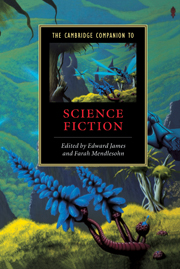Book contents
- Frontmatter
- Introduction
- Part 1 The history
- 1 Science fiction before the genre
- 2 The magazine era: 1926–1960
- 3 New Wave and backwash: 1960–1980
- 4 Science fiction from 1980 to the present
- 5 Film and television
- 6 Science fiction and its editors
- Part 2 Critical approaches
- Part 3 Sub-genres and themes
- Further Reading
- Index
- Series List
6 - Science fiction and its editors
from Part 1 - The history
Published online by Cambridge University Press: 28 May 2006
- Frontmatter
- Introduction
- Part 1 The history
- 1 Science fiction before the genre
- 2 The magazine era: 1926–1960
- 3 New Wave and backwash: 1960–1980
- 4 Science fiction from 1980 to the present
- 5 Film and television
- 6 Science fiction and its editors
- Part 2 Critical approaches
- Part 3 Sub-genres and themes
- Further Reading
- Index
- Series List
Summary
More than in any other popular genre, and for that matter more than in most publishing in general, sf's editors and publishers have from the beginning played a highly visible and sometimes controversial role in the evolution and ideology of the field and its readership. While relatively few readers of other genres such as mystery and romance are even aware of the names of the magazine and book editors who select and sometimes shape the texts that collectively define those fields, sf editors have from the beginning played a more visible and sometimes even celebrated role; it is perhaps indicative of this that the leading American mystery award is named the Edgar, after Edgar Allan Poe, while the most publicized sf award, the Hugo, is named after an editor and publisher, Hugo Gernsback. By the same token, the Hugos (voted on by fans and awarded at the annual World Science Fiction Convention) have since 1973 included a category for 'Best Professional Editor,' while the Edgar Award includes no such category (although its Ellery Queen Award, originally intended for collaborations, has sometimes gone to editors and publishers instead). Science fiction editors are frequent guests at fan conventions, and a substantial number of readers can trace their first allegiance to the field by citing the work of anthologists from Judith Merril to Gardner Dozois, or (in an older generation) to the magazines of Gernsback, John W. Campbell, Jr, or Horace Gold. Equally important, the ongoing dialogue of ideas, and increasingly of styles and forms, that has defined the field's sometimes insular identity, is in large measure the result of quite deliberate editorial intervention, often accompanied by editorial position papers and even manifestoes. This is not to suggest that sf is or has been a 'managed literature', but it is a literature that has often and sometimes loudly proclaimed a sense of mission, and this mission has in large measure been articulated and promoted by the field's editors.
- Type
- Chapter
- Information
- The Cambridge Companion to Science Fiction , pp. 96 - 110Publisher: Cambridge University PressPrint publication year: 2003
- 2
- Cited by

